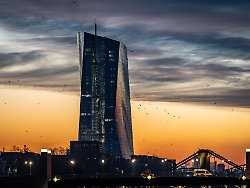Most sensitive moment since founding
War and inflation grip the ECB
3/9/2022 3:52 p.m
Europe’s currency guardians meet regularly to define monetary policy for the coming months. However, this meeting is anything but routine. In view of the exploding energy prices and the economic consequences of the war, the ECB faces an insoluble dilemma.
Two weeks after the outbreak of war in Ukraine, the European Central Bank (ECB) has to set its interest rate course. Prices in the euro area are rising at a record pace, making things difficult for the currency watchdogs, who were still talking about an approaching turnaround in interest rates at the beginning of February. But the tremors of the war on the doorstep of the EU are getting the ECB into trouble. In view of the high economic risks for the euro area, there is much to be said for cautious action. The end of the ultra-low interest rate era may be a long way off.
The arms race instigated by commodity giant Russia – Moscow calls it a “special operation” – is fueling inflation fueled by skyrocketing oil and gas prices. According to ECB chief economist Philip Lane, it is now important not to rush into the intended normalization of monetary policy. But if the central bank waits too long, the idea of permanently high inflation threatens to get stuck in the minds of consumers. Then the currency guardians would have to tighten the reins all the more violently later on. Bundesbank boss Joachim Nagel warns that the normalization of monetary policy must be kept in mind.
“It is not an exaggeration to say that the ECB is facing its most delicate moment since it was founded,” says economist Thomas Gitzel from Liechtenstein’s VP Bank. Within the ECB, there is now an oath: “Which side will the European currency guardians take? Are inflation risks or economic risks weighted more heavily?” Unlike the US Federal Reserve, some experts believe that the ECB will continue to put off interest rate hikes.
Delete the word “short”.
This is also because the geographical proximity to the war and the energy price rally are threatening to choke off the domestic economy, according to the analysts at the research house BCA: “The Ukraine war is delaying any ECB interest rate hike until 2023.”
Despite high inflation, the central bank in Frankfurt has so far followed a relatively relaxed course, even if the bond purchases via the PEPP pandemic emergency program will end in a few weeks. However, the smaller program APP continues to run in a modified form. The end is still open. However, this is a prerequisite for the turnaround in interest rates, which is to be started “shortly” after the end of the program. That’s what it says in the ECB’s Forward Guidance – that is, the guideline for the financial markets.
According to Commerzbank economist Michael Schubert, the ECB could achieve more flexibility if it deleted the word “short”: “Depending on the data, interest rate hikes are still possible, but not mandatory.” It may also signal the end of the summer acquisitions, but reserve the right to resume.
Inflation expectations explode, the economy collapses
According to the ECB, the projections for growth and inflation for the interest rate meeting on March 10 will take into account the foreseeable consequences of the Russian invasion. “This should lead to a discount in the growth forecasts, but in return catapult the inflation forecasts significantly upwards,” says DWS economist Ulrike Kastens. In their view, inflation for 2022 as a whole could rise to over five percent on average and also exceed the ECB’s target of 2.0 percent in the medium term.
For comparison: In December, the ECB economists expected the average inflation rate this year to be 3.2 percent. For 2023 and 2024, 1.8 percent were estimated. “The Russian war of aggression in Ukraine is counteracting a gradual stabilization of energy prices and a gradual decline in the high inflation rates,” says KfW chief economist Fritzi Köhler-Geib. At the same time, the Western sanctions against Russia increase the risk of new price increases.
The euro zone economy is also likely to be affected. ECB council member Mario Centeno even sees the danger of stagflation – i.e. an economy bobbing along with high inflation at the same time. Patrick Hussy from the investment consulting firm Sentix believes that fresh economic stimulus is almost impossible for the ECB because of the risk of inflation. In a survey of investors, she measured a slump in economic expectations unprecedented in the barometer’s 20-year history.
